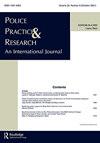Policing a pandemic: investigating San Antonio’s response to COVID-19’s new crime of public health violations
IF 1.8
Q2 CRIMINOLOGY & PENOLOGY
引用次数: 1
Abstract
ABSTRACT After the novel coronavirus began spreading across the U.S., many state and local governments imposed COVID-19 restrictions in an attempt to slow the spread. These COVID-19 mitigation techniques had a large impact on policing, as they created a new crime category for police to enforce, COVID-19 public health violations. The current study aims to address some of the uninvestigated questions about policing a pandemic using a unique dataset that combines three sources of official data from San Antonio, Texas. Specifically, we examine the associations between enforcement of COVID-19 public health violations, police calls for service, and COVID-19 case numbers. We also test for interactions between COVID-19 case numbers and police calls for service with respect to a change in the enforcement of COVID-19 public health violations. Results indicate that both police calls for service and COVID-19 case numbers are significantly associated with enforcement activities for COVID-19 public health violations. Additionally, enforcement is conditioned by the amount and type of police calls for service. Policymakers should consider the work and responsibilities the agencies they expect to enforce these COVID-19 policies already have. Haphazardly assigning an agency, such as the police, this new role without carefully considering whether they can feasibly take on more could lead to less enforcement of the COVID-19 restrictions.监管大流行:调查圣安东尼奥对COVID-19新公共卫生违法犯罪的反应
在新型冠状病毒开始在美国传播后,许多州和地方政府实施了COVID-19限制措施,试图减缓传播。这些缓解COVID-19的技术对警务工作产生了重大影响,因为它们为警察执法创造了一个新的犯罪类别,即COVID-19公共卫生违规。目前的研究旨在利用一个独特的数据集,结合来自德克萨斯州圣安东尼奥的三个官方数据来源,解决一些关于监管流行病的未调查问题。具体而言,我们研究了COVID-19公共卫生违规执法、警方服务呼吁和COVID-19病例数之间的关系。我们还测试了COVID-19病例数与警方就COVID-19公共卫生违规行为执法变化的服务要求之间的相互作用。结果表明,警方的服务电话和COVID-19案件数量与COVID-19公共卫生违法行为的执法活动显著相关。此外,执法取决于警察要求服务的数量和类型。政策制定者应考虑他们期望执行这些COVID-19政策的机构已有的工作和责任。随意指定一个机构,如警察,这一新角色,而不仔细考虑他们是否可以承担更多的责任,可能会导致COVID-19限制的执行力度减弱。
本文章由计算机程序翻译,如有差异,请以英文原文为准。
求助全文
约1分钟内获得全文
求助全文
来源期刊

Police Practice and Research
CRIMINOLOGY & PENOLOGY-
CiteScore
4.10
自引率
5.60%
发文量
50
期刊介绍:
Police Practice and Research is a peer-reviewed journal that presents current and innovative police research as well as operational and administrative practices from around the world. Articles and reports are sought from practitioners, researchers and others interested in developments in policing, analysis of public order, and the state of safety as it affects the quality of life everywhere. Police Practice and Research seeks to bridge the gap in knowledge that exists regarding who the police are, what they do, and how they maintain order, administer laws, and serve their communities. Attention will also be focused on specific organizational information about the police in different countries or regions. There will be periodic special issues devoted to a particular country or continent.
 求助内容:
求助内容: 应助结果提醒方式:
应助结果提醒方式:


